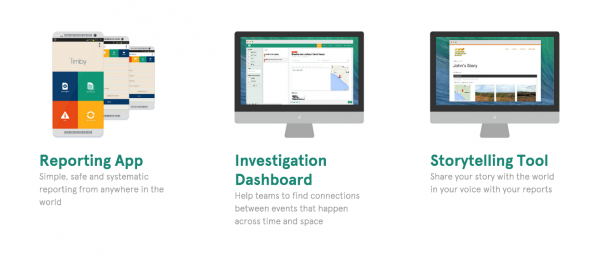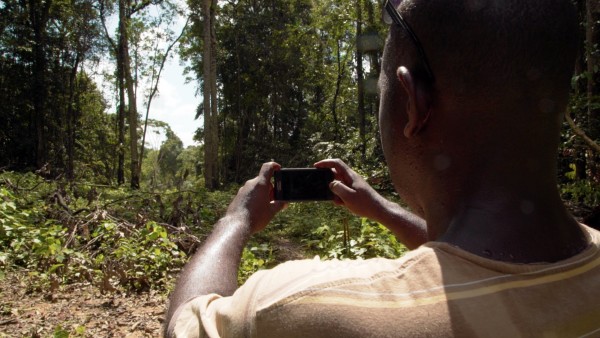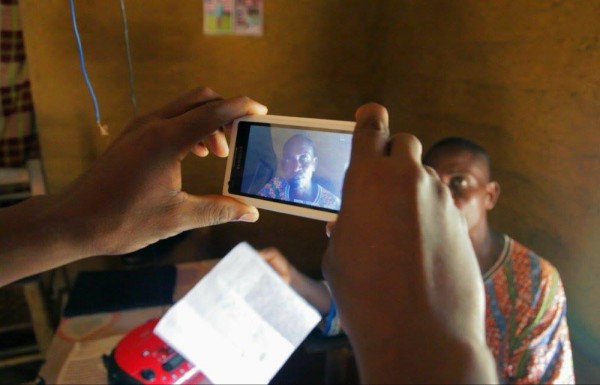Working with Liberian citizens, This Is My Backyard (TIMBY) managed to get 60 forestry utilisation contracts cancelled, highlight millions of dollars of misspent county social development funds, and most recently unearth a 10.5 million dollar scandal, where corporate funding didn’t go through government accounts.
There’s a new “scramble for Africa” because of growing pressure from commodity hungry nations for timber, minerals and agricultural lands. As a result Liberia is fast becoming a hotspot for unscrupulous deals. We’ve heard about blood diamonds and conflict oil, but Charles Taylor - convicted of war crimes - paid for the last years of his war in Liberia with wood.
President Ellen Johnson Sirleaf (the first democratically elected president since the civil war) had pledged to reform the forestry industry and cut corruption within the government, but little seems to have changed in the past decade. Corruption is still rife, affecting poor rural communities in Liberia. Since taking office in 2006 nearly 25 percent of the country’s land seems to have been questionably sold to loggers as vast tracts are cleared for palm oil plantations and mineral extraction. Rural communities continue to experience regular threats and pressure from companies and the government. Local people outraged by their ancestral lands being taken over and livelihoods destroyed, until recently have been unable to effectively have their voices heard and share experiences with the wider world.
TIMBY - mixing solid data gathering and creative storytelling
A network of concerned citizens led by activist Silas Siakor of the Sustainable Development Institute (SDI) has been collecting evidence of government and company infractions over the past decade, however most of this information has been stored in collective memory or trapped in reports on old virus ridden computers.
In August 2014, through funding from Making All Voices Count, SDI partnered with This is My Backyard (TIMBY) Productions Incorporated to address this challenge. The project - TIMBY: amplifying citizens’ voice in rural Liberia to improve service delivery - was born with the aim of creating a secure and effective mechanism for evidence-based reporting of environmental crimes such as illegal logging.
A crucial feature of the project is that it empowers Liberian citizens to carry out near real-time reporting with the aim of creating much needed transparency around illegal environmental activities. This enables citizens to hold businesses and government to account and ensure that communities’ voices are central to dialogues on what happens to Liberia’s land and resources.

TIMBY have developed three interconnected digital tools which underpin the project: an app, an investigation dashboard and a storytelling tool.
By the end of the Making All Voices Count funding period in December 2015, the project had circulated the TIMBY reporting application on 30 smart phones across Liberia, used by twice as many reporters. As a result 303 robust reports were submitted ranging from photographs, videos, audio clips of contentious court decisions, official correspondence and copies of contracts and environmental impact assessment reports.
The app encrypts, time-stamps and geo-references mobile reports allowing the project to build a strong, and easy-to-use evidence-based system, whilst keeping citizens anonymous and safe in the field. These reports are uploaded, stored and analysed on the investigation dashboard (a web-based platform). Project staff state that, ‘it is incredibly impressive to see the quality and robust clarity of these reports – learnt through the trainings in person and the training videos.’ Finally the storytelling tool is an interactive experience that helps the users put together the reports in a tight-knit narrative with linked evidence to have best possible impact with the government and the world.
TIMBY has helped with our security. You know journalists are always under the threat of libel charges when they accuse those in power of wrongdoing. So TIMBY helps us provide hard evidence that protects us from libel charges. - Citizen Journalist

Copyright: TIMBY.org
We got much more involved into in-depth investigation after TIMBY. It helps us get the actual facts, the proof, to do more in-depth analysis. - Citizen Journalist
What change happened as a result?
The project has greatly enhanced citizens’ capacity and confidence to engage both government and companies regarding their communities’ land rights, livelihoods and resources. In terms of impact, the group managed to get more than 60 forestry concessions cancelled, highlight millions of dollars of misspent county social development funds, and most recently unearth a 10.5 million dollar scandal, where corporate funding didn’t go through government accounts.
There were many smaller wins, such as getting companies to sign memorandums of understanding (MoUs) to not encroach on their land. The group also used the reports and information in countless closed-door meetings with companies and government officials. Also turnaround time for verified evidence during the life of the project went from months to weeks.
When we confront the companies, we have harder evidence to show them. They are more cooperative than they would be otherwise. The authorities that uphold the laws are very slow. Good quick data helps us to get authorities (FDA, NBC, MoA) to move faster to investigate claims. - Sustainable Development Institute

Copyright: Timby.org
TIMBY put the process in the hands of the community, and changed the power relationships between SDI and the local youth. They became the drivers of the investigation, the owners of the information and they could bring their own issues forward. As a result they felt empowered to own the process and it felt like it was theirs. I don’t believe this would have happened without TIMBY.- Sustainable Development Institute
One of the most powerful stories of change in practice and policy is that of Equatorial Palm Oil and the Jogbhan Clan (see Part One and Part Two). Through documenting the challenges experienced around a take-over of their land and subsequent interactions with the courts, the Jogbhan Clan were able to hold the Equatorial Palm Oil company and the Liberia Government to account, and protect their rights over their land.
Challenges included the company presenting a letter allegedly written by the local clan chief that granted permission for the company to move into the land. When the local clan chief spoke up and said the letter was not his (among other things, he is illiterate and could not have written the letter), he was dismissed from his position by the central government (in itself this is illegal – you cannot dismiss an elected clan chief). Their concerns were presented to central government and resulted in President Sirleaf granting the entire community a meeting, during which she promised the company would no longer expand into their land. Ebola hit shortly thereafter, but the negotiations continued after the emergency period. As of December 2015, the clan chief was given back his position and from January 2016, the company and community are mapping their land together.
Future Actions
TIMBY is nothing without great people on the ground who are already doing great work. TIMBY is a tool, nothing more and nothing less, that advances the work of creative/innovative/impassioned organisations and individuals. - TIMBY
As a result of its success the project is still expanding in Liberia two years after the MAVC project ended. Current plans are to scale up use of TIMBY so that it becomes one of the main reporting tools used by organisations across Liberia to report on environmental crimes.
The team are motivated to continue to figure out how to make these technologies safer, more accessible, scalable and free. They are intent on integrating reporting systems into mainstream media, local and national governance and justice systems, and ensuring there are feedback mechanisms to communities that lack even basic phone network.
The innovation project This is My Backyard - TIMBY received the support of £40,000 from Making All Voices Count and was implemented from August 2014 to December 2015.